

If Dr. Seuss Was Actually A Doctor. David Icke. David Vaughan Icke (/aɪk/; IKE, born 29 April 1952) is an English writer, public speaker and former professional footballer.
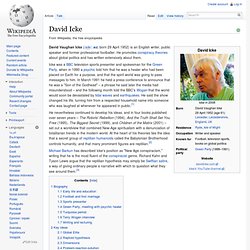
He promotes conspiracy theories about global politics and has written extensively about them. He nevertheless continued to develop his ideas, and in four books published over seven years – The Robots' Rebellion (1994), And the Truth Shall Set You Free (1995), The Biggest Secret (1999), and Children of the Matrix (2001) – set out a worldview that combined New-Age spiritualism with a denunciation of totalitarian trends in the modern world.
At the heart of his theories lies the idea that a secret group of reptilian humanoids called the Babylonian Brotherhood controls humanity, and that many prominent figures are reptilian.[2] Michael Barkun has described Icke's position as "New Age conspiracism," writing that he is the most fluent of the conspiracist genre. Biography[edit] Early life and education[edit] Football and first marriage[edit] An Interview Without Words: Illustrator Shaun Tan Draws Conclusions - SPIEGEL ONLINE - News - International. How does an award-winning children's book illustrator answer questions?
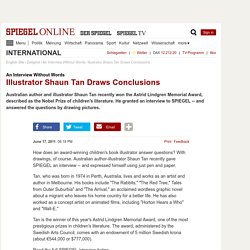
With drawings, of course. Australian author-illustrator Shaun Tan recently gave SPIEGEL an interview -- and expressed himself using just pen and paper. Tan, who was born in 1974 in Perth, Australia, lives and works as an artist and author in Melbourne. His books include "The Rabbits," "The Red Tree," Tales from Outer Suburbia" and "The Arrival," an acclaimed wordless graphic novel about a migrant who leaves his home country for a better life. He has also worked as a concept artist on animated films, including "Horton Hears a Who" and "Wall-E. " Tan is the winner of this year's Astrid Lindgren Memorial Award, one of the most prestigious prizes in children's literature. Read the full SPIEGEL interview below. SPIEGEL: Mr. François Rabelais. François Rabelais (French: [fʁɑ̃.swa ʁa.blɛ]; c. 1483 – 9 April 1553) was a major French Renaissance writer, doctor, Renaissance humanist, monk and Greek scholar.
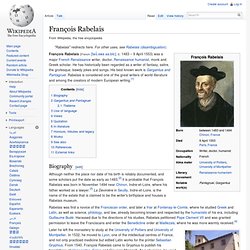
He has historically been regarded as a writer of fantasy, satire, the grotesque, bawdy jokes and songs. His best known work is Gargantua and Pantagruel. Rabelais is considered one of the great writers of world literature and among the creators of modern European writing.[1] Biography[edit] Although neither the place nor date of his birth is reliably documented, and some scholars put the date as early as 1483,[2] it is probable that François Rabelais was born in November 1494 near Chinon, Indre-et-Loire, where his father worked as a lawyer.[3] La Devinière in Seuilly, Indre-et-Loire, is the name of the estate that is claimed to be the writer's birthplace and houses a Rabelais museum. Howard Jacobson. Howard Jacobson (born 25 August 1942) is a Man Booker Prize-winning British author and journalist.
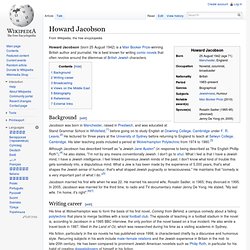
He is best known for writing comic novels that often revolve around the dilemmas of British Jewish characters. Background[edit] Jacobson was born in Manchester, raised in Prestwich, and was educated at Stand Grammar School in Whitefield,[1] before going on to study English at Downing College, Cambridge under F. R. Leavis.[2] He lectured for three years at the University of Sydney before returning to England to teach at Selwyn College, Cambridge. Although Jacobson has described himself as "a Jewish Jane Austen" (in response to being described as "the English Phillip Roth"),[4] he also states, "I'm not by any means conventionally Jewish. Jacobson married his first wife when he was 22. Writing career[edit] His fiction, particularly in the six novels he has published since 1998, is characterised chiefly by a discursive and humorous style. Broadcasting[edit] Views on the Middle East[edit] Fiction.
Aldous Huxley versus George Orwell - Words, Language & Poetry - Ego Dialogues. The Karma Bum by Tyler Stoddard Smith. I was nine years old in 1983, when my father, a professor at Rice University, invited Allen Ginsberg to Houston to give a poetry reading with the promise of financial assistance from the dean of humanities.
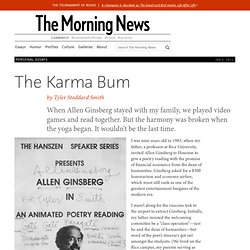
Ginsberg asked for a $300 honorarium and economy airfare, which must still rank as one of the greatest entertainment bargains of the modern era. I wasn’t along for the raucous trek to the airport to extract Ginsberg. Initially, my father insisted the welcoming committee be a “class operation”—just he and the dean of humanities—but word of the poet’s itinerary got out amongst the students. (We lived on the Rice campus, my parents serving as “masters” to one of the residential colleges. From what I could tell, masters were responsible for talking down drug-addled students and assuring them their parents would not disinherit them if they switched majors from mechanical engineering to French.) “Goddamnit, you’re going to get the boy high!” I asked my mother what the big deal was. “Huh?”